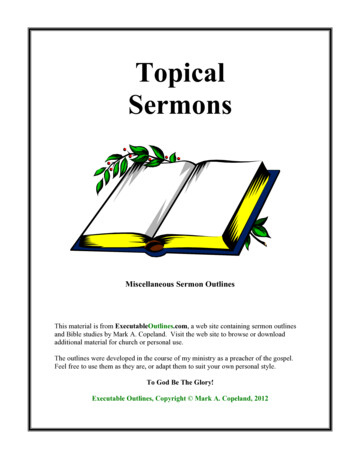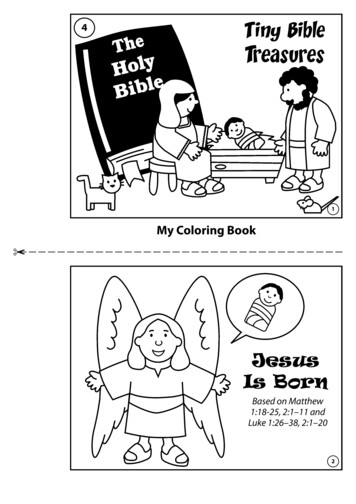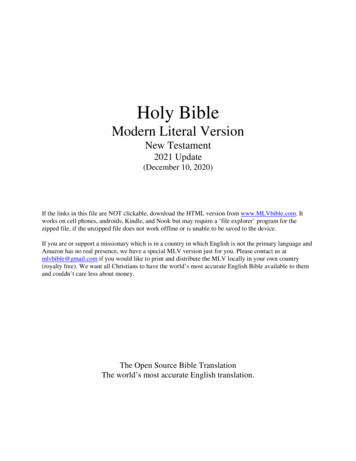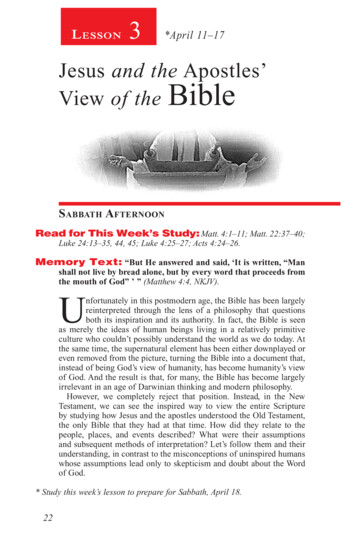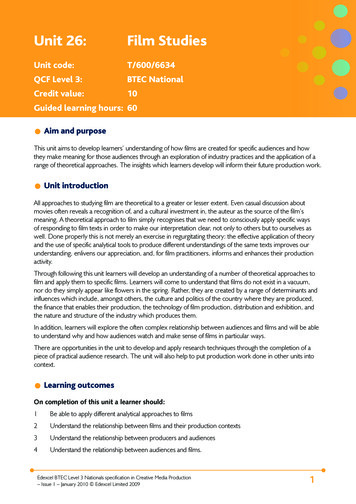
Transcription
Chapter-by-Chapter Bible StudiesMalachi“Looking ForHis Coming”Bible Studiesby Kathleen Daltonwww.kathleendalton.com
Malachi“Looking ForHis Coming”Table of ContentsScriptureIntroduction to MalachiPage5How to Begin aConversation with God(Chapter 1)7What to do WhenGod Rebukes You(Chapter 2)15A Challenge for All Times –Stay in Your Safe Place Or Take a Risk(Chapters 3&4) 232
Looking For His ComingA Chapter-by-Chapter Bible Study of the Book of MalachiIntroduction to MalachiQuestions are a great way to start a conversation. When the rightquestion is asked, everyone in the conversation is given an open doorto say what they are thinking and to learn in the process.The Old Testament prophet, Malachi, knew the art of conversation. Hepresents his messages to God’s people in the form of questions somefrom God .some from His people, the Jews. We are given anarmchair seat, as we read through Malachi, to view this conversationwith God, and to ask ourselves how we would answer.You will probably feel guilty at times as you listen to this conversation– because God could easily be speaking these things to you, some2,500 years after the time of Malachi. And at other times you will feelfull of hope, for the solution to guilt is still the same as it was so longago .the Savior from sin. Malachi looks forward to the coming of thatSavior. He taught the Jews of his day to also look forward to Hiscoming. In his thought-provoking style, he will teach us the samething. And then, in a time yet to come, Malachi will add his voice tothe voices of 144,000 Jewish “Malachi” ‘s as they zero in on theremaining chosen people of God with the same message of hope – ThePromised Savior is Coming Again!.Malachi Background James Montgomery Boice, The Minor Prophets, has an excellentsection on Malachi.I always like Barnes’ Notes for the Old Testament prophets.Malachi is no exception.3
The Bible Background Commentary (John H. Walton) for the OldTestament is helpful with cultural questions.The name means “my messenger”Some have wondered if the name was only a title, and not aproper name (for several reasons mainly because the name“Malachi” is translated “His messenger” in chapter 1, verse 1, ofthe Septuagint)Most likely, Malachi was the last prophet of the Old Testamentera – a contemporary of Nehemiah.Abraham2,000 B.C.Moses1,500 BC 4MalachiDavid1,000 BCJesusB.C. – A.D.Now2,000 A.D.Babylon500 BCMalachi’s writing style is prose – including a series of questionsasked both by the LORD and the people of Israel.Malachi speaks of the certainty of the coming Day of God’sWrath, but also includes great hope for those who fear His nameThe last 2 verses in the book predict the coming of Elijah beforethe coming of Christ. That explains why the priests of Jerusalemthought John the Baptist might be Elijah (John 1:21) and whyJewish families today leave a seat empty for Elijah at thePassover table.Malachi is a link between the Old and New Testaments, not justbecause it is physically between the two in your Bible, butbecause it accurately summarizes the whole Old Testament inthat it points to the promised Old Testament Messiah of Israel asthe only hope for the whole world.
Looking For His ComingA Chapter-by-Chapter Bible Study of the Book of Malachi“How to Begin a Conversation With God”Malachi Chapter 1 - Questions1.2.3.4.5.(:1-5) God makes a statement, and the Jews answer witha question. What is the statement, and what is thequestion?a. Why would the Jews ask thisquestion? What do you suppose theyare thinking that would make themask this?b. Have you ever wondered if God reallyloves you?c. What was God’s answer to theirquestion?d. What is God’s answer to you?e. What is the proper response to Godwhen He has answered this question?(:6) God makes a statement, then God asks a question,then God makes another statement, then the priests ask aquestion. What are they?a. God’s statement:b. God’s question:c. God’s statement:d. The Priest’s question:(:7-14) This passage goes on to describe the priests ofIsrael and how they are looking at their responsibility.What were they doing?(:14) Look at the last part of this verse. What reasondoes God give them for not doing things the way theywere doing them?Have you ever been guilty of giving God less than what Hedeserved? Have you ever given a gift to God knowing itwas not the best you could give? Why did you do that?APPLICATION:6.If you could ask God one question, and you knew He wouldanswer, what would it be?7.Why would you ask that particular question?8.Are you willing to accept rebuke as part of God’s answer toyour question?9.Do you realize that God also has questions for you?5
“How to Begin a Conversation With God”Malachi Chapter 1 – Discussion NotesStart out your Bible Study time with these two questions: If you could ask God one question, and you knew He wouldanswer, what would it be? What is the reason you would like to ask that particularquestion?If you studying this book as a group, go around your circle and giveeach person a chance to answer the first question, and also thesecond. Take time to listen to each other’s answers – you will learn alot about each other as you realize the questions each has for God. Noone has all the answers .most of us just have a lot of questions.The point of this “questions” conversation above is to help each of usrealize the value of having questions for God, and the importance ofactually voicing them. God knows the questions we have, but none ofus will probably ever benefit from those questions until we are braveenough to ask them out loud and then are brave enough to listen toGod’s answers.Now .in Malachi chapter 1, Malachi voices a few questions for us:1.(:1-5) God makes a statement, and the Jews answer witha question. What is the statement, and what is thequestion?The statement by God: “I have loved you.”The Question by the Jews: “How have You loved us?”Here are some things we might ask to understand this better: Why would the Jews ask this question? What do you supposethey are thinking that would make them ask this? Seems like they are being slightly tongue-in-cheek withthis question almost as if to challenge God’s words. “Youlove us”? “It sure doesn’t look like it”! They arewondering if God really loves them.6
Looking For His ComingA Chapter-by-Chapter Bible Study of the Book of Malachi How did things get so bad that they are wondering if God reallyloves them? They were chosen by God long ago, in the time of theirancestor, Abraham. They were led by God’s man, Moses,out of slavery in Egypt. They were given the ability toconquer those who would have killed them in the land ofCanaan, and were able to occupy this land God hadpromised to them. They had a mighty and Godly King,David, who led them to trust in God and to be themightiest nation in the world for a little while. Then theirown sin drew them down and away from God, and theybecame a weak, defenseless nation, conquered by ruthlessenemies and carried away into slavery. But God saw theirpitiful condition and brought them back home to theirsweet homeland. And He spurred them on to rebuild theirtemple and once again worship Him. All of that sounds pretty good. It all sounds like God did,indeed, love them, and was definitely showing it. What was sobad that they now are brazen enough to laugh in the face of Godwhen He says He loves them? What had gotten so bad was their own sin, once again.We’ll see, in the next 2 chapters, just how bad it hadgotten. When anyone is given over to sin, anger at Godjust boils near the surface. Awful but true. So .the Jews are being rebellious here kind of snotty with God.What was God’s answer to their question? I have chosen you. That’s how you know I have lovedyou. I chose you. I saw you as you were, loved you, andchose you to be my own. I drew you to me. I helped yousee Who I Am. I helped you see your own sin and howmuch you needed me. I did all those things. That is proofenough that I love you no matter how hard your lifemight feel. There may be others around you who bragthat they don’t need God. There may be others who seemto be happier or better off than you. But I have notchosen them I have chosen you .you are loved, they arenot. Believe it.7
At this point it would be smart for us to ask ourselves aquestion: What is the proper response to God when He hasbeen willing to talk so honestly with us? Verse 5: “The LORD be magnified beyond the borders ofIsrael.” In other words, “May God be seen for Who He iseverywhere in the universe – not just in my little world.”In other words, the proper response is humility. The rightthing to do is let the whole world know I accept Who Godis, and bow my knee to whatever He has chosen for mylife. The response God is looking for is me turning awayfrom my own selfish nature and turning my eyes on Hisholiness.2.(:6) God makes a statement, then God asks a question,then God makes another statement, then the priests ask aquestion. What are they?a. God’s statement: “ A son honors hisfather, and a servant his master.”b. God’s question: “So why don’t youhonor me?”c. God’s statement: “You priests havedespised my name”d. The Priest’s question: “How have wedespised your name?”Sounds kind of like a conversation between a parent and an extremelyrude child, doesn’t it? Sort of like the 5-year-old who boldly looks youin the eye asking “What goldfish in the toilet?”3.(:7-14) This passage goes on to describe the priests ofIsrael and how they are looking at their responsibility.What were they doing?The priests of Israel had a job to do. They were to teach the people ofIsrael and thus the people of the world what God was like. As thepriests went about the business of the temple as they offeredsacrifices they would be showing the world that God was perfect andcould not be approached by imperfect people. The sacrifices made onthe altar were to show that a perfect sacrifice was necessary to paythe price for an imperfect person to have the right to enter thepresence of God.But the priests of Israel were taking shortcuts. They were sacrificingthe weak and sickly or blemished of the animals, saving the strongest8
Looking For His ComingA Chapter-by-Chapter Bible Study of the Book of Malachiand the healthiest for themselves - to increase their own wealth.They were saying to themselves ”what a shame to kill the healthiest,best animals. Let’s pick out the animals who are not going toreproduce well and sacrifice those. That way we will increase in ourown riches and of course God wants us to prosper so He’llunderstand.”God understood, all right. But it wasn’t OK with Him. The picture thepriests were commissioned to give the world was being ruined. Thepurpose of the sacrifices was to show the world that someday a perfectsacrifice was coming. A perfect sacrifice an unblemished sacrifice asinless sacrifice was coming. And once that sacrifice was made, therewould never be a need to a sacrifice ever again.All those sacrifices – all those animals slain and offered upon the altarin the temple – were for one purpose – to point to Jesus, whosomeday would be the perfect sacrifice.And the priests were making it impossible for the people ofIsrael .and the people of the world to have faith in the perfectsacrifice that would someday come. By sacrificing the weak and sicklyanimals, the priests were putting a stumblingblock in the way ofpeople who needed to come to God by faith.The priest were worse than useless they were blaspheming God.4.(:14) Look at the last part of this verse. What reasondoes God give them for not doing things the way theywere doing them?“My name is feared among the nations.” You ridiculous priests! Doyou think God will be mocked? Do you think God will be fooled? Doyou think God will accept less than the praise He deserves? What inthe world are you thinking?If the priests were doing less than they were supposed to .sacrificinganimals which were less than what God required .they were not onlydisobedient, they were just plain dumb. They were missing a chanceto serve the Almighty King of the Universe, and thinking it didn’tmatter. Foolish.5.Have you ever been guilty of giving God less than what Hedeserved? Have you ever given a gift to God knowing itwas not the best you could give? Why did you do that?9
APPLICATION:6. Have you ever wondered if God really loves you?7. What questions do you have for God?8. Are you willing to accept rebuke as part of God’s answer toyour question?9. Do you realize that God also has questions for you?Is there a chance you are like the priests of God in Malachi’s time?Are you giving less than God requires? How will you know whether ornot you are just like them?I’ll tell you how. Start a conversation with God.How do you begin a conversation with God?Ask honest questions. Ask those questions even if you are afraid Godwill answer with rebuke. It’s better to be rebuked by God than tonever talk with Him at all. Talk to Him. Tell Him your honestthoughts. Ask Him how you are doing. Believe me, He’ll let you know.“Search me, O God, and know my heart; try me and know my anxiousthoughts. And see if there be any hurtful way in me, and lead me inthe everlasting way.” Psalm 139:23&24Here’s a promise: If you are brave enough to start that conversationwith God, it will end with a longing look into the skies. Once youactually connect with God, your natural response is to want to seeHim .to want to know Him better .to want to talk with Himagain even if you found, in your connection with Him, that you weremuch worse than you thought. When you finally get a chance to talkto God, your eyes will more often go to the skies, longing for Him tocome back again - “Behold, He is coming with clouds, and every eyewill see Him ” (Rev. 1:7) – because you will find that you can’t getenough of Him.10
Looking For His ComingA Chapter-by-Chapter Bible Study of the Book of Malachi“What to Do When God Rebukes You”Malachi Chapter 21.2.3.4.5.6.7.8.9.10.11.12.13.- Questions(:1-2)
“Malachi” is translated “His messenger” in chapter 1, verse 1, of the Septuagint) Most likely, Malachi was the last prophet of the Old Testament era – a contemporary of Nehemiah. Malachi’s writing style is prose – including a series of questions asked both by the LORD and the people of Israel. Malachi speaks of the certainty of the coming Day of God’s Wrath, but also includes .

